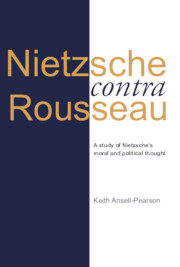Book contents
- Frontmatter
- Contents
- Preface
- Note on the texts and list of abbreviations
- Introduction
- 1 Nietzsche contra Rousseau
- 2 Civilization and its discontents: Rousseau on man's natural goodness
- 3 Squaring the circle: Rousseau on the General Will
- 4 Nietzsche's Dionysian drama on the destiny of the soul: on the ‘Genealogy of Morals’
- 5 Zarathustra's descent: on a teaching of redemption
- 6 Bending the bow: great politics, or, the problem of the legislator
- Conclusion
- Notes
- Bibliography
- Index
Introduction
Published online by Cambridge University Press: 03 May 2011
- Frontmatter
- Contents
- Preface
- Note on the texts and list of abbreviations
- Introduction
- 1 Nietzsche contra Rousseau
- 2 Civilization and its discontents: Rousseau on man's natural goodness
- 3 Squaring the circle: Rousseau on the General Will
- 4 Nietzsche's Dionysian drama on the destiny of the soul: on the ‘Genealogy of Morals’
- 5 Zarathustra's descent: on a teaching of redemption
- 6 Bending the bow: great politics, or, the problem of the legislator
- Conclusion
- Notes
- Bibliography
- Index
Summary
‘My humanity is a constant self-overcoming’.
Nietzsche, Ecce Homo, ‘Why I am so wise’.ON THE PROBLEM OF HISTORY AS A PROBLEM OF TIME
To be heirs of the writings of Rousseau and Nietzsche is to be the inheritors of two of the most powerful and disturbing critiques of civilization that the modern period has produced. Indeed, I would go so far as to contend that part of what it means to be a modern man or woman – or even post-modern for that matter – is to take up the task of engaging in some kind of confrontation (Auseinandersetzung – denoting ‘settlement’ and ‘exchange’) with the paradoxical and ambiguous teachings of both Rousseau and Nietzsche. The questions which Rousseau raised concerning the value of civilization have lost none of their relevance in our ecological age, while Nietzsche's diagnosis of axiological nihilism (a diagnosis resulting from his own deeply felt experience of the death of God) to describe the condition of modern Occidental humanity haunts the events of the twentieth century as a nightmare from which we have yet to wake up. Nietzsche's experience – he once described himself as the first perfect nihilist – has now become our own. Thus, Rousseau and Nietzsche are two thinkers who embody the modern experience and who provide the perfect foil for our own anxieties. Both thinkers' love of paradox accounts for the fact that the key notions of their thinking are still subject to a variety of often conflicting interpretations, and their legacy is deeply ambiguous.
- Type
- Chapter
- Information
- Nietzsche contra RousseauA Study of Nietzsche's Moral and Political Thought, pp. 1 - 18Publisher: Cambridge University PressPrint publication year: 1991

